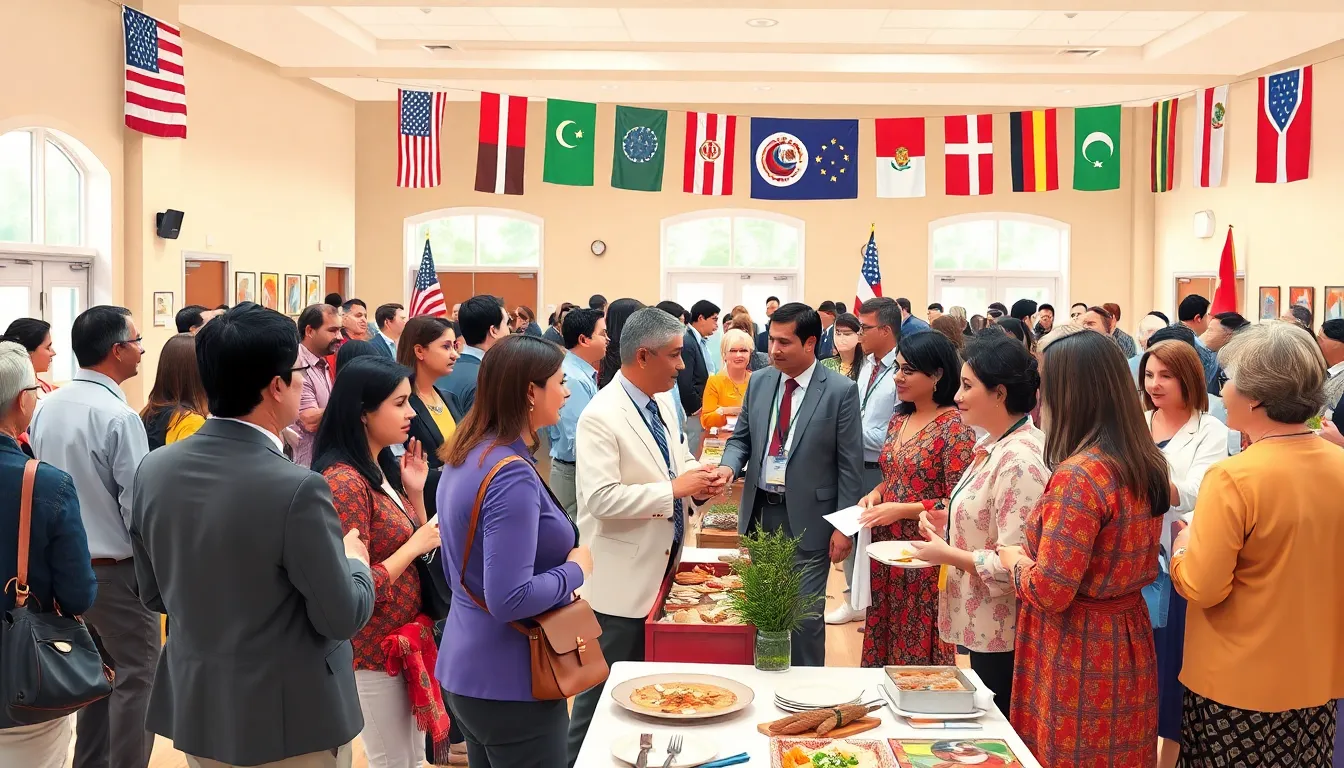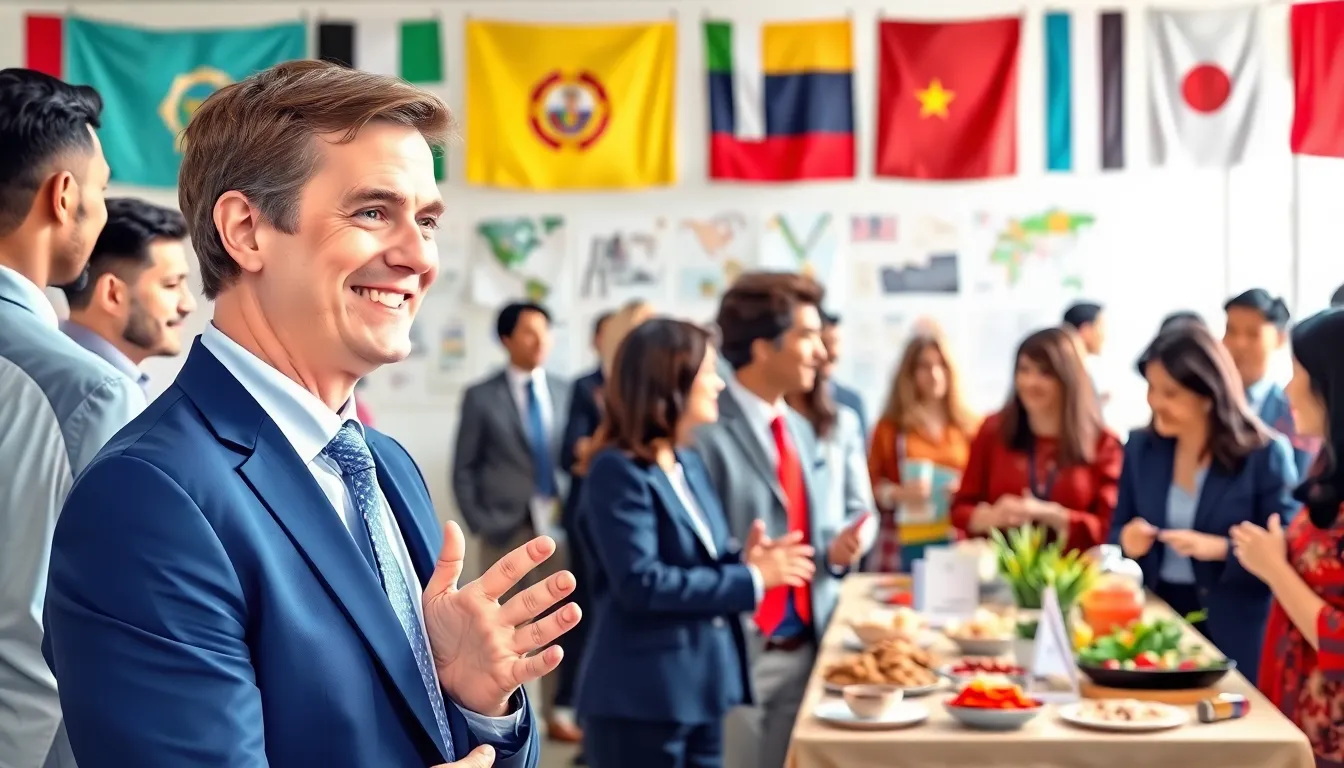In a world where global politics often feels like a high-stakes game of chess, local diplomatic events are the unsung heroes quietly shaping relationships right in their own backyards. These gatherings bring together diplomats, officials, and community leaders, all while serving up a side of networking that could rival any cocktail party. Who knew diplomacy could be this much fun?
Table of Contents
ToggleOverview of Local Diplomatic Events
Local diplomatic events play a significant role in enhancing community relationships. These gatherings bring together diplomats, officials, and community leaders, fostering connections through networking. Engaging in discussions about trade, cultural exchange, and policy allows participants to address local issues while building mutual understanding.
Events occur in various formats, such as conferences, roundtable discussions, and receptions. Each format provides opportunities for participants to exchange ideas and collaborate on projects that benefit their communities. Specific events, like cultural festivals or educational workshops, often highlight local traditions, enticing broader participation.
Outcomes from these events extend beyond immediate interactions. Strengthened ties can result in increased investment, tourism, and educational exchanges. Cities often prioritize hosting events to attract attention and showcase their unique offerings, underscoring their diplomatic significance.
Community involvement enhances the effectiveness of these events. When locals participate, their perspectives contribute valuable insights that inform decisions made by officials. Projects derived from discussions at these events frequently aim to address pressing local concerns.
Successful local diplomatic events require meticulous planning and execution. Organizations that host these events focus on logistics, outreach, and ensuring diverse representation among participants. A well-executed event can lead to lasting partnerships that enhance collaborative efforts within the community.
Consequently, local diplomatic events serve as vital platforms for fostering cooperation. Engaging in dialogue during these events nurtures a sense of community and solidarity among diverse groups. Participants leave these gatherings with renewed commitments to work together towards shared goals, which ultimately benefits the entire community.
Importance of Local Diplomatic Events

Local diplomatic events serve crucial roles in strengthening community ties and facilitating vital discussions. Their impact extends beyond formal negotiations, fostering a spirit of cooperation.
Cultural Exchange
Cultural exchange thrives at local diplomatic events, connecting diverse communities and encouraging understanding. These gatherings allow participants to share traditions, art, and customs, enriching the local environment. Attendees often engage through performances, exhibitions, or culinary showcases, which invite cultural appreciation. Such experiences promote dialogue and break down barriers. By highlighting shared values while respecting differences, cultural exchange nurtures stronger relationships among residents. Increased awareness of diverse cultures creates an inclusive atmosphere, leading to community cohesion. Overall, the outcomes of cultural exchange contribute significantly to enhancing local diplomacy.
Economic Development
Economic development emerges as a key advantage of local diplomatic events, driving growth and attracting investment. Attendees frequently discuss trade opportunities and collaboration on business ventures, creating lasting partnerships. Participation from local entrepreneurs and international investors opens doors to new markets and innovation. Local diplomatic events also promote tourism, showcasing the area’s unique offerings and potential. Relationships built during these gatherings can lead to job creation and infrastructure improvement. By fostering discussions on strategic initiatives, economic development becomes a priority. Ultimately, these events serve as pivotal platforms for enhancing the economic landscape of the community.
Recent Notable Local Diplomatic Events
Recent local diplomatic events have showcased the dynamic interactions among community leaders, government officials, and diplomats. These gatherings highlight the importance of connection and collaboration in addressing local issues.
Event Highlights
Notable events included the annual Trade and Cultural Exchange Conference held in September. This conference attracted over 300 participants and featured discussions on economic partnerships and cultural understanding. Another prominent event was the Community Dialogue Festival, where local artists and international diplomats shared their creative perspectives. The festival celebrated diversity through workshops and live performances, promoting the exchange of ideas among attendees. Local Chambers of Commerce played pivotal roles in sponsoring these events, which facilitated job creation and strengthened community ties.
Key Takeaways
Attendees left with enhanced insights into regional opportunities. Networking facilitated lasting collaborations among businesses and officials. Economic discussions emphasized investment potentials, leading to future developments. Cultural sharing fostered mutual respect and understanding, crucial for community cohesion. Immediate benefits included increased tourism and local engagement, with local leaders committing to ongoing dialogue. Event planners emphasized the need for diverse representation and strategic planning to ensure success and broader impact.
Challenges in Organizing Local Diplomatic Events
Organizing local diplomatic events presents several challenges. Logistical issues often arise, such as securing suitable venues that accommodate diverse attendees. Managing schedules can become complicated due to conflicting calendars of diplomats and community leaders.
Security concerns also play a significant role. Ensuring the safety of all participants often requires additional resources and planning. Compliance with regulations and protocols for hosting dignitaries is imperative, which can prove daunting for organizers.
Budget constraints frequently hinder event planning. Funding limitations affect the scale and scope of events, reducing potential collaboration opportunities. Sponsors and partners may not always align with the event’s goals, complicating resource allocation.
Promoting events effectively poses another challenge. Reaching target audiences involves strategic marketing to engage community members, yet it requires skilled communication to convey the event’s significance. Balancing outreach with budget constraints can limit promotional efforts.
Cultural sensitivity is crucial in diplomatic events. Misunderstandings can arise between different cultural backgrounds, emphasizing the importance of inclusivity in planning. Event organizers should be aware of diverse perspectives to ensure respectful interactions among participants.
Lastly, measuring the impact of local diplomatic events can be difficult. Collecting data on outcomes is essential for evaluating success, but it requires structured methodologies. Identifying quantifiable benefits, such as economic growth or strengthened relationships, remains a crucial yet challenging aspect of the event’s legacy.
Future Trends in Local Diplomatic Events
Local diplomatic events increasingly leverage technology to enhance participation. Virtual platforms provide new avenues for engagement, allowing officials and community members to connect across distances. Hybrid formats combine in-person interactions with virtual attendance, broadening audience reach and inclusivity.
Networking remains a cornerstone of these gatherings. Enhanced social media strategies enable real-time updates and engagement, fostering ongoing dialogues beyond the events themselves. People are more willing to participate when they can share experiences instantly, thus amplifying the event’s impact on community relationships.
Cultural themes are gaining prominence in local diplomatic events. Organizers emphasize artistic showcases and culinary exchanges to foster a deeper understanding of diverse backgrounds. Collaborative projects featuring local artists alongside international counterparts create unique experiences that encourage mutual appreciation.
Sustainability emerges as a significant focus as well. Planners prioritize eco-friendly practices, selecting venues that align with green initiatives and encouraging responsible practices among attendees. This commitment not only promotes environmental awareness but also aligns local diplomatic efforts with global sustainability goals.
Demographic shifts influence the content of these events. As communities become more diverse, inclusivity in representation attracts a wider audience and fosters richer dialogues. Engaging younger generations through tailored programming cultivates future leaders and encourages active participation in local diplomacy.
Data collection becomes a priority for assessing outcomes. Stakeholders increasingly seek to evaluate the effectiveness of events through surveys and feedback mechanisms. Measurements of community engagement and economic impact provide insights into future planning, guiding decisions based on quantifiable results.
The evolving landscape of local diplomatic events emphasizes the importance of adaptation and collaboration. By staying agile in response to community needs, organizers can continue to strengthen relationships, foster economic development, and enhance cultural understanding.
Local diplomatic events are essential for building stronger community ties and fostering economic growth. They create opportunities for collaboration and cultural exchange that benefit everyone involved. As communities adapt to new challenges and embrace technological advancements, these gatherings will continue to evolve.
The focus on inclusivity and sustainability ensures that future events resonate with diverse audiences and promote lasting relationships. By prioritizing engagement and understanding, local diplomatic events can drive positive change and create a vibrant atmosphere for dialogue and cooperation. The commitment to ongoing collaboration will ultimately shape a more connected and prosperous community.



